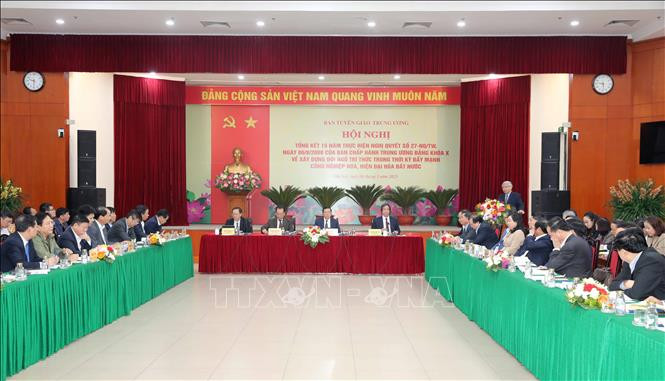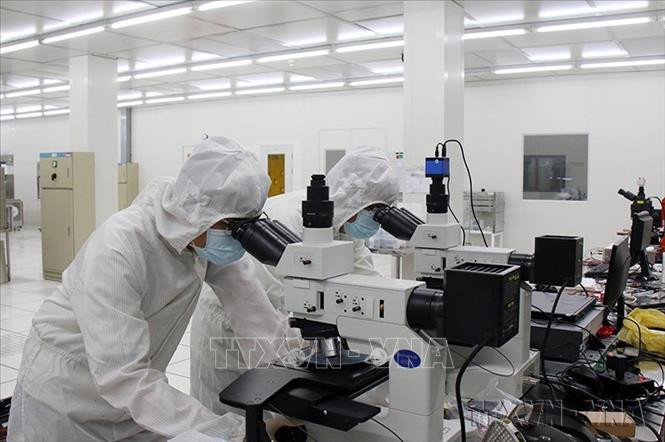With the viewpoint that "Talents are the vitality of the nation", throughout the history of building and defending our country, talents and intellectuals have always been the foundation of social progress.
Nowadays, in the process of innovation and national development initiated and led by the Communist Party of Vietnam, along with the rapid development of the scientific and technological revolution, the intellectual team has become a particularly important resource, creating national strength in the development strategy.

How to make the intellectuals feel secure in researching, creating, disseminating knowledge, making worthy contributions and truly becoming a driving force for the revolutionary cause, realizing the major goals of national development, has always been a top priority and a strategic breakthrough that the Party has identified and determined to carry out in recent years.
On August 6, 2008, at the 7th Conference, the 10th Party Central Committee issued Resolution No. 27-NQ/TW on "Building a contingent of intellectuals in the period of accelerating industrialization and modernization of the country". Afterwards, the 12th Party Central Committee Secretariat issued Conclusion No. 52-KL/TW, dated May 30, 2019, continuing to implement Resolution No. 27-NQ/TW.
The Resolution affirms our Party's major viewpoints on intellectuals and sets out important policies on building and promoting the role of intellectuals in the cause of industrialization, modernization of the country and international integration.
The Resolution clearly states: "Intellectuals are intellectual workers, with high levels of education in a certain specialized field, with the ability to think independently, be creative, disseminate and enrich knowledge, creating spiritual and material products of value to society. Vietnamese intellectuals come from many classes and social strata, especially workers and farmers; most of them mature in the new society, formed from many training sources at home and abroad, with many successive generations, including Vietnamese intellectuals abroad". "Building a strong intellectual team is directly raising the intelligence of the nation, the strength of the country; improving the leadership capacity of the Party and the quality of the political system's operations. Investing in building an intellectual team is investing in sustainable development".
From there, the resolution sets the goal: "By 2020, build a strong intellectual team with high quality, reasonable quantity and structure, meeting the development requirements of the country, gradually advancing to the level of intellectuals in advanced countries in the region and the world".
Over the past 15 years, the implementation of Resolution No. 27-NQ/TW has achieved many very encouraging results. The number of Vietnamese intellectuals has grown rapidly. Statistics up to 2017 show that it is estimated that the whole country has about 6.5 million people with college or university degrees or higher, an increase of more than 3.7 million people compared to 2009 (the first year of implementing Resolution No. 27-NQ/TW). According to this result, the number of Vietnamese intellectuals has increased by about 2.8 million people after 9 years (2009 - 2017) compared to 2.25 million people in the 10 years before the issuance of Resolution No. 27-NQ/TW (1999 - 2009). In addition, it is estimated that there are about 600,000 intellectuals with university degrees or higher out of a total of 5.3 million Vietnamese people abroad.
This team is increasingly improving in quality, becoming a leading force in the Fourth Industrial Revolution and international integration. The environment, infrastructure, material and technical conditions for intellectual activities are increasingly improved. These have helped the team of intellectuals promote dynamism and creativity, which is increasingly evident in each step of the country's progress.
Vietnam's Global Innovation Index (GII) has been continuously improved and enhanced over the years. In 2020, Vietnam ranked 42/131 countries, leading the group of countries with income levels, ranking 3rd in ASEAN. Labor productivity growth rate has been continuously increased (average in the period 2016-2020 was 5.8%, higher than the period 2011-2015 at 4.3%); the proportion of high-tech product export value in the total export value of goods has been increased (from 19% in 2010 to about 50% in 2020).
The Vietnamese innovative startup ecosystem has been formed and developed. According to statistics, there are currently 3,000 innovative startups, a three-fold increase compared to 2017, making Vietnam the third country in Southeast Asia in terms of innovative startups. The intellectual property system and quality standards and measurements are increasingly improved; the number of scientific research works published internationally by Vietnamese intellectuals has tended to increase rapidly in recent years.
Assessing the intellectual community after 15 years of implementing Resolution No. 27-NQ/TW, the 13th Politburo stated: this is a force that has made important contributions to the cause of building and defending the Fatherland. This group has become an important force promoting the realization of goals, tasks, strategies, and plans for rapid and sustainable national development in the spirit of the Resolution of the 13th National Party Congress; contributing to consolidating the great national unity bloc on the basis of the worker-peasant-intellectual alliance.
However, in addition to positive results, the Politburo believes that there are still some limitations and shortcomings such as: The system of legal documents related to the building and development of intellectuals is not complete and synchronous. Resolutions are slow to be institutionalized into mechanisms and policies; there is a lack of breakthrough mechanisms and policies, especially policies to mobilize resources for training, fostering, attracting, rewarding and honoring domestic and foreign intellectuals, especially elite intellectuals and leading scientists; investment is still scattered and not focused on key areas; there are not many strong scientific, educational, cultural and economic facilities.
Practicing democracy, respecting and promoting initiative in research and creative activities for intellectuals is still limited and inadequate... The structure of intellectuals is still unreasonable in terms of profession, region, and age; there are not many strong scientific groups with regional and world prestige; there are not many great creative works.

According to Professor - Doctor Le Huu Nghia, former member of the Party Central Committee, former Director of the Ho Chi Minh National Academy of Politics, the biggest "bottleneck" in the implementation of Resolution No. 27-NQ/TW in recent times is that the awareness of some leaders at all levels about promoting the role of intellectuals in the cause of socio-economic development and innovation is not at the right level; in the past 15 years, there have not been any real breakthroughs in awareness and policies to promote the role of intellectuals.
It is worth noting that Resolution No. 27-NQ/TW defines the goal of "building a strategy for developing intellectuals by 2020". However, up to now, the national strategy on developing intellectuals is only in the draft stage to collect opinions from relevant parties. The policy is in place but there is a lack of a mechanism to guide its implementation. The lack of a complete legal framework to institutionalize the Party's viewpoints and guidelines on intellectuals makes the process of implementing the Resolution at all levels of Party committees, agencies and units encounter many difficulties.
Dr. Phan Chi Hieu, President of the Vietnam Academy of Social Sciences, shared: Our team of scientific researchers is thinning out, many famous scientific researchers, names of the country with high academic titles and degrees have reached retirement age. In addition, many good scientists have asked to transfer their work agencies, for various reasons, one of which is a very simple reason: the guarantee for research activities and policy settlement is not as good as that of agencies outside. We are witnessing the phenomenon of "brain drain".
Meanwhile, Dr. Phan Xuan Dung, Chairman of the Vietnam Union of Science and Technology Associations, said: "All countries in the world that want to develop must consider science and technology as the top national policy. That is a major policy, this policy must be truly concretized into policies and solutions for application. That is to respect intellectuals, use intellectuals, honor intellectuals and create conditions for intellectuals to work. Here, it is not just about salary but also working conditions, respecting them, assigning them work, and importantly, when their products are created, they must be applied."
Sharing the same view, Associate Professor - Doctor Doan Dinh Phuong, Institute of Materials Science, Vietnam Academy of Science and Technology shared that his institute was assigned to research fillers, a raw material used in fireproof paint, but when the product was available, for several years it could not be transferred to production as goods due to difficulties in product pricing. In the end, the institute's scientists had to set up a workshop to produce it themselves, then sell it to paint manufacturing companies. "Our main job is research, not production, so let the manufacturing companies do this," Associate Professor - Doctor Doan Dinh Phuong said.
In recent times, Vietnam’s economy has been undergoing positive changes, developing in depth, gradually reducing its dependence on natural resource exploitation, gradually shifting to relying on the strong application of science, technology and innovation. The role of scientists is therefore more important than ever.
It is necessary to recognize that our country's science and technology level has a significant gap compared to the leading countries in Southeast Asia and there are still limitations and barriers that need to be overcome in the coming period.
Therefore, in order to promptly remove "bottlenecks", unleash resources for national development from the intellectual community, aiming to build a Vietnamese intellectual community that is patriotic, politically steadfast, professionally competent, dedicated to their profession, and has the aspiration to contribute to the development of a prosperous and happy country, it is extremely necessary for the Party to issue a new document on the intellectual community in the current context.